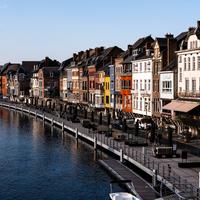9. Belgische Tijd: Frans als enige officiële taal
9. Belgische Zeit: Französisch als einzige Amtssprache
9\. Belgian Time: French as the only official language
Heure belge : le français comme seule langue officielle
In de 19e eeuw, na het ontstaan van België in 1830, veranderen de taalverhoudingen in het Brusselse pas echt.
||||||||||||language relations||||only|
In the 19th century, after the emergence of Belgium in 1830, the language relations in Brussels really changed.
De bourgeoisie verfranste verder, er waren talrijke Franse en Waalse immigranten en voor het eerst zou ook de Vlaamse bevolking in enkele generaties massaal op het Frans overschakelen.
||Frenchified||||numerous|||Walloon||||||||||||||massively||||switch
The bourgeoisie further Frenchified, there were numerous French and Walloon immigrants and for the first time the Flemish population would also switch en masse to French in a few generations.
Hiervoor waren tal van oorzaken.
||numerous||causes
There were many reasons for this.
Frans als enige officiële taal
||only||
French as the only official language
De grondwettelijke taalvrijheid geldt in de praktijk vooral voor de overheid zelf.
|constitutional|language freedom|applies|||practice||||government|
Reeds op 16 oktober 1830 werd het Nederlands, dat een voorkeursbeleid had genoten onder Koning Willem I, als officiële taal afgeschaft.
||||||||preferential policy||||||||||
De enige officiële taal van de jonge gecentraliseerde staat werd Frans, hoewel de meerderheid van de Belgische bevolking Vlaams was.
|||||||centralized||||||majority||||||
The only official language of the young centralized state became French, although the majority of the Belgian population was Flemish.
Frans werd de taal van het gerecht, de administratie, het leger, de cultuur, het onderwijs en de media.
||||||court||||army||||education|||
French became the language of justice, administration, the military, culture, education and the media.
Het genoot het aura van vooruitgang, cultuur en universalisme en gold als kenmerk van "fatsoen".
|enjoyed||atmosphere||progress|||universalism||gold||feature||decency
It enjoyed the aura of progress, culture and universalism and was considered the hallmark of "decency."
Het Nederlands daarentegen had geen enkel aanzien en werd beschouwd als een taal van kleine boeren en arme arbeiders.
||on the other hand||||prestige|||regarded||||||peasants||poor|
In contrast, Dutch had no prestige and was considered a language of small farmers and poor workers.
Naast de geografische taalgrens tussen Vlaanderen en Wallonië, lag er dus in feite ook een sociale taalgrens tussen Vlamingen en Franstaligen.
||geographical|language border|||||||||fact||||||Flemish people||
Thus, in addition to the geographical language boundary between Flanders and Wallonia, there was in fact a social language boundary between Flemish and French speakers.
Het Frans was de taal van de politieke en economische suprematie van de maatschappelijke elite en een symbool voor opwaartse sociale mobiliteit.
||||||||||supremacy|||||||||upward||social mobility
French was the language of political and economic supremacy of the social elite and a symbol of upward social mobility.
Dat Frans spreken chic stond, was ook de Franse dichter Charles Baudelaire niet ontgaan, die bij zijn kortstondige verblijf in België de huichelarij van de bourgeoisie aanklaagde.
|||stylish||||||poet|Charles Baudelaire|Baudelaire||escaped||||short-lived|stay||||hypocrisy||||denounced
That speaking French was chic had not escaped even French poet Charles Baudelaire, who, during his brief stay in Belgium, denounced the hypocrisy of the bourgeoisie.
"In Brussel kan men geen Frans, niemand kan het, maar ze doen alsof ze geen Vlaams kennen: dat getuigt van goede smaak.
||||||||||||as if||||||testifies|||taste
"In Brussels they can't speak French, nobody can, but they pretend they don't know Flemish: that shows good taste.
Het bewijs dat ze het wel degelijk kennen, is dat ze hun dienstpersoneel in het Vlaams afblaffen."
|evidence|||||indeed||||||service staff||||bark at
The proof that they do know it is that they bark at their service personnel in Flemish."
De nieuwe Belgische hoofdstad was ook nog steeds een hoofdzakelijk Nederlandstalige stad, waar de inwoners een lokale vorm van het Zuid-Brabants spraken.
|||||||||mainly||||||||||||Brabant|
The new Belgian capital was also still a primarily Dutch-speaking city, where residents spoke a local form of South Brabant.
Er woonde een Franstalige minderheid van ongeveer 15 procent, die vooral bestond uit Fransen die waren ingeweken tijdens de voorgaande decennia.
|||||||||||||||migrated|||previous|
A French-speaking minority of about 15 percent lived there, composed mainly of Frenchmen who had moved in during the previous decades.
Toch verhief de eerste burgemeester, Nicolas Rouppe, in 1830 ook voor Brussel het Frans tot enige bestuurstaal.
||||mayor|Nicolas|Rouppe|||||||||official language
Yet in 1830, the first mayor, Nicolas Rouppe, also made French the sole language of administration for Brussels.
Het politieke centrum in de hoofdstad trok de financieel-economische elite aan, waardoor Brussel snel een Franssprekende bovenklasse en middenklasse kreeg.
||||||||||||||||French-speaking|upper class|||
In 1846 gaf al 37,6% van de bevolking van Brussel-stad (het centrum) aan Franssprekend te zijn; in Gent was dit 5 procent, in Antwerpen 1,9 procent.
||||||||||||French-speaking||||||||||
In 1846, 37.6 percent of the population of Brussels City (the center) already indicated that they were French speakers; in Ghent it was 5 percent, in Antwerp 1.9 percent.
Een belangrijk deel van die zogenaamde Franstaligen was echter Vlaamse burgerij die zich als Franssprekend opgaf, ook al waren ze van afkomst Nederlandstalig.
|||||||||||||||claimed to be||||||descent|
An important part of these so-called French speakers, however, was Flemish bourgeoisie who registered themselves as French-speaking, even though they were of Dutch-speaking descent.
In 1860 sprak ruim 95% van de bevolking van Vlaanderen Nederlands, maar deze mensen hadden door het cijnskiesrecht nauwelijks economische en politieke macht en zagen de beheersing van het Frans als volkomen noodzakelijk om hogerop te raken.
|||||||||||||||census suffrage|||||||||control|||||completely|||upward||to get ahead
In 1860, over 95% of the population of Flanders spoke Dutch, but these people had little economic or political power due to the coterminous suffrage and saw the mastery of French as entirely necessary to rise higher.

